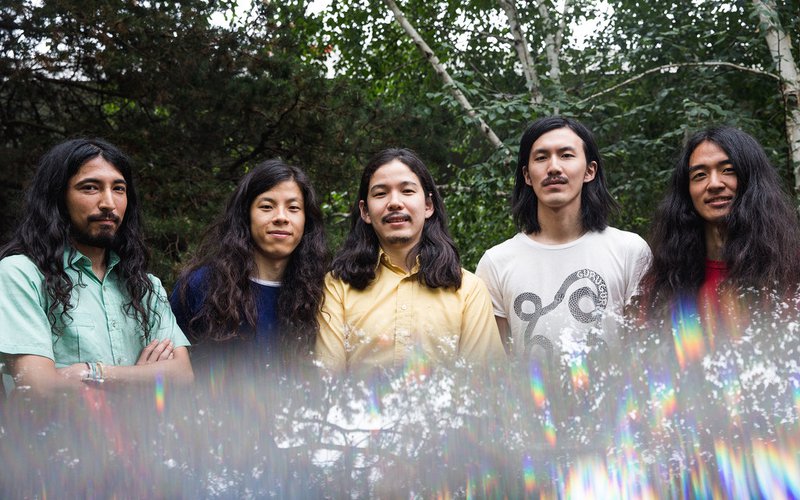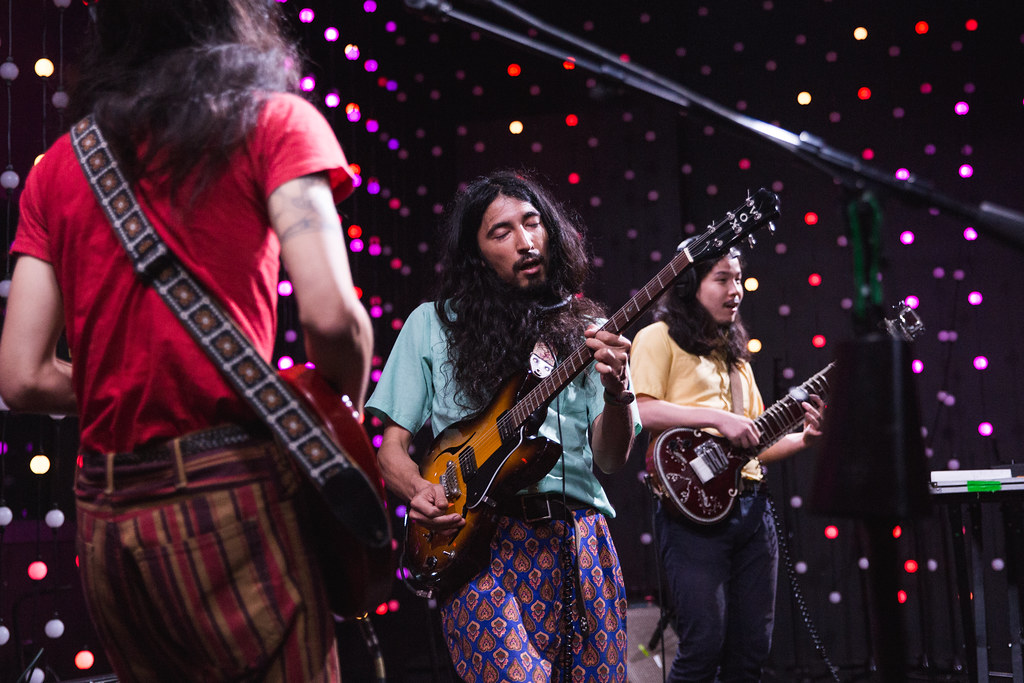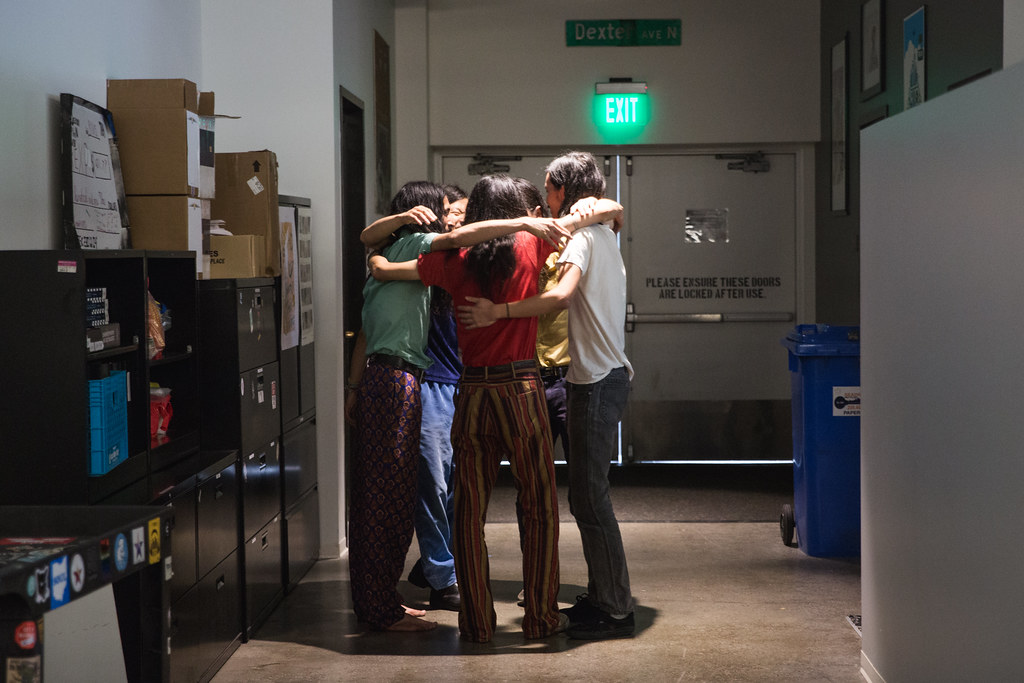
Listening to Kikagaku Moyo is to be lifted from your seat and thrown out of the current universe and timeline. That sounds more painful than it actually is. In reality (or maybe what we perceive as this reality), the Japanese psych-rock outfit has continually made music that not just expands outward and allows the band to experiment with otherworldly sounds but also taps into a feeling of bliss. The heavy use of sitar and the swirling, ephemeral tones of their guitars mixed with the whispery vocals coalesce to form a sound that’s just as mind warping as it is comforting. From the haziness of their 2014 debut Forst of Lose Children to the glacial temperance of 2016’s House in the Tall Grass, they’ve continued to tap into a feeling of tranquility in their music. On their latest record, Masana Temples (out now on GuruGuru Brain), Kikagaku Moyo steps away from the harshness of winter and into the summer sun. And that’s meant in quite a literal sense.
"We wanted to create a record that makes us feel good in both our mind and body," drummer and vocalist Go Kurosawa tells KEXP over email. "Utopia means feeling free and not being afraid of doing what you really like. Feeling good is Utopia."
The word “masana” itself was coined by the band and is meant to invoke this idea of Utopia, a centering of self and just plain happiness. For an album that can be amorphous with long, dreamy instrumental passages, there is a surprising physicality to the album. It’s not “visceral” in the sense that gets prescribed to hard rock, but instead feels like it rushes over your body like a calming breeze or fresh air rushing into your lungs. That feeling is strong on the record but felt more palpably in the band’s live performances. Just take a look at some of the clips from the band’s recent in-studio interspersed throughout this article and you’ll see what I mean. In performance, the band hones in on the spiritual cores of these songs and expands them out as an even grander offering to the universe.
Catching up with drummer and vocalist Go Kurosawa over email, the utopian aspects of the record become clearer. KEXP picks his brain on the changes within the band's approach, collaborating with a producer mostly known for his work in jazz, and how nature and environment continue to impact their creative process.
KEXP: You created the word “Masana” for this album. How did that word come into existence and how did you prescribe it a meaning?
Go Kurosawa: The word popped into my mind one day. I kept saying it during the tour and Masana became our favorite word.
The title is meant to reflect an idea of Utopia and harmony. What drew you to creating music around this idea? What does Utopia mean to you?
We wanted to create a record that makes us feel good in both our mind and body. Utopia means feeling free and not being afraid of doing what you really like. Feeling good is Utopia.
Throughout your previous albums, you were all living in a house together in Tokyo and you all moved to different areas – some to different countries. How were you able to make the long-distance work while still being a collaborative band?
We wrote most of the songs in two months in the last year. We decided that all of us would put at least one idea every week into Dropbox. We would listen to it and try to make a song from it. After we had rough tracks, we started playing those songs in shows and try them out and also practice them in our soundchecks.

Did having some time apart from one another help inspire any creativity?
Yes and no. When we are separate, we have different influences in our own lives and we share and talk about it. But it’s different than before when we all lived together and played music anytime we want.
You worked with Bruno Pernadas who is known mostly as a jazz musician. You’ve said the choice to work with someone from a different musical background. What brought you to him and how influential do you think he was on the final product?
After discovering his solo records, I was playing his records in the van on tour for the band. He is predominantly a jazz guitarist but after listening to his records I could hear lots of influences and that’s what we liked the most about him. We sent demo songs and asked if he would be interested in producing us. After he said yes, we found out that he didn’t know about us and that we were the first band he ever produced other than his own band. The process was smooth because we knew what kind of sound we were looking for and he put spices around. It was very collaborative and we loved it.
Do any of you have a background in jazz? What similarities have you found between psychedelic music and jazz while working on Masana Temples?
None of us have a jazz background but we love listening to it. I am not sure about the similarities because we don’t really distinguish these two. There are many jazz records which, to me, are more psychedelic than some “psych” bands. We learned that both styles of music are actually very similar in the sense that you have to improvise. It makes you naked and, when we improvise, we have to be true to ourselves.
The sitar is featured prominently on this record and has been a staple of your sound for a while now. I understand that sitarist Ryu Kurosawa previously studied the instrument in India. What about that sound appeals to you most?
He uses both an electric and an acoustic sitar. We like the fact he is a sitarist and not a guitarist who plays sitar because when we improvised or give a riff, he can develop simple melodies more differently by using microtone or overtone.
Experimentation has been a constant throughout the band’s history. What compels you to seek out new sounds? What were some of the “unconventional’ techniques and experiments that you executed on this record?
Our goal was to have sounds that sounded great to our ears. During our recording from [bassist] Kotsuguy’s home in Fukushima, which is surrounded by the mountains, there was thunderstorm hitting there and he recorded the sound. We also captured field recordings from places along the tour and put together in Amayadori. It ended up sounding as if you were in the rainforest with thunder, birds, and some other sounds.
You recorded your last album House in the Tall Grass in the winter and the music on that record really reflects the feeling of that season. Do you find your environment has an impact on your writing process? Where did you record Masana Temples and did it affect your songwriting/recording?
I think being on the road so much made us want to make a record of our experience being in different places with the same group of people. We recorded the album in Lisbon, Portugal right after our tour in the US in March. It was very cold in the US and as soon as we arrived in Portugal, we felt so happy and relaxed. I think that because this record was recorded in a warm sunny place, it has a more warm vibe than House in the Tall Grass.
So many of these songs I can imagine expanding even larger in a live setting. Are you prone to improvisation in concerts? How do the songs change shape once you have an audience in front of you?
Right now, we’ve been practicing some of the songs every day in soundcheck but we’re still too sloppy to play them live actually. After we nail them down, I’m pretty sure we will start changing things around.
You’ve been touted as hailing from Japan’s experimental scene. What is that community like? Do you collaborate with many artists outside of Kikagaku Moyo? What artists from Tokyo are you most excited about right now?
We collaborate with different artists for the designs for our merch, artwork, and music videos. We usually just send the music and let them draw whatever they like. In the future, we would like to collaborate with a movie director and to see how a band could make the entire movie soundtrack like Popol Vuh or Tangerine Dream.
With every release, it feels like you all find new ways to reimagine your sound and create something totally fresh and new. Where would you like to go next musically? Are you working on anything right now?
First, we will need more time to listen to music and time to relax at home then we will know what kind of sound we want to make next. We are pretty much on the road non-stop this year so we haven’t been able to do that.

In celebration of the release of their fourth full-length album 'Masana Temples,' Tokyo's Kikagaku Moyo shares some of their favorite songs spanning psychedelic rock, drone rock, acid folk, and more on their hypnotic guest DJ mix for Midnight in a Perfect World.
Day 2 of KEXP's visit to the OFF Music Festival in Katowice, Poland was a perfect reflection of what founder Artur Rojek is aiming for: diversity not only in sound but in origin. KEXP's DJ Morgan spent time chatting with musicians from around the globe: up-and-coming Warsaw band Bastard Disco, Toky…
We wrapped up day two of the OFF Festival in Katowice, Poland in the wee hours of the morning, tired but very happy and with the desire to reflect on the many positive aspects of the festival. We have been so impressed with OFF Festival, not just because of the high caliber of the lineup but also i…